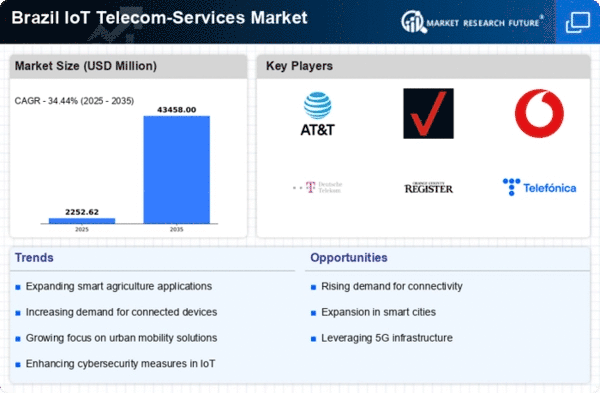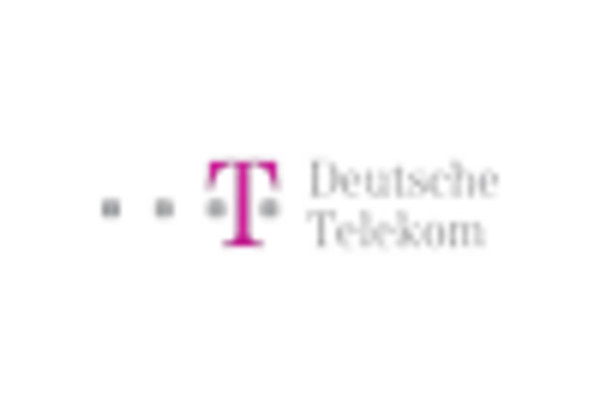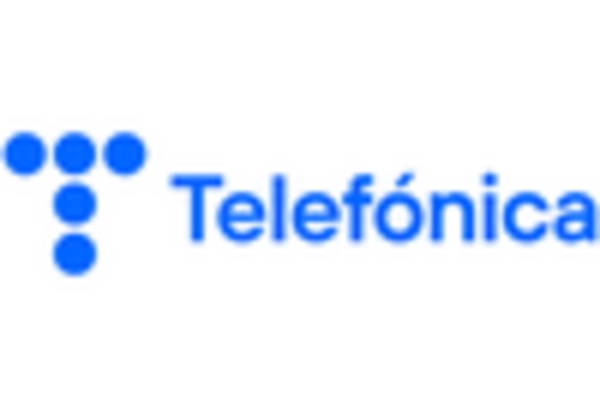Emergence of 5G Technology
The rollout of 5G technology in Brazil is poised to revolutionize the iot telecom-services market. With its promise of faster speeds and lower latency, 5G enables a new wave of IoT applications that were previously unfeasible. By 2025, it is anticipated that 5G will cover over 50% of the population, facilitating advancements in areas such as autonomous vehicles, smart grids, and telemedicine. This technological leap is likely to attract significant investment from telecom operators, eager to capitalize on the enhanced capabilities of 5G. As a result, the is expected to flourish., driven by the demand for high-speed connectivity and innovative IoT solutions.
Rising Demand for Connectivity
The increasing demand for connectivity in Brazil is a primary driver for the iot telecom-services market. As urbanization accelerates, more devices require reliable internet access. In 2025, it is estimated that over 70% of households in urban areas will have at least one smart device, necessitating robust telecom infrastructure. This surge in demand compels telecom providers to enhance their services, leading to innovations in IoT solutions. The Brazilian government has recognized this trend, investing in telecommunications to support the growing need for connectivity. Consequently, the is likely to experience substantial growth. as more consumers and businesses seek integrated solutions.
Enhanced Data Security Concerns
As the number of connected devices increases, so do concerns regarding data security in the iot telecom-services market. In Brazil, businesses and consumers are becoming more aware of the potential risks associated with IoT devices, prompting a demand for secure telecom solutions. The government has introduced regulations aimed at protecting user data, which is expected to drive innovation in security protocols among telecom providers. This focus on security not only addresses consumer concerns but also enhances the overall credibility of IoT services. Consequently, the emphasis on data protection is likely to stimulate growth in the iot telecom-services market as companies seek to offer secure and reliable solutions.
Investment in Smart City Initiatives
Brazil's commitment to developing smart cities is significantly influencing the iot telecom-services market. With initiatives aimed at improving urban living through technology, cities like São Paulo and Rio de Janeiro are implementing IoT solutions for traffic management, waste management, and public safety. The government has allocated approximately $1 billion for smart city projects, which is expected to drive demand for IoT services. This investment not only enhances the quality of life for residents but also creates opportunities for telecom companies to provide innovative services. As these projects progress, the iot telecom-services market is poised for expansion, driven by the need for advanced connectivity solutions.
Growth of Industrial IoT Applications
The industrial sector in Brazil is increasingly adopting IoT technologies, which is a significant driver for the iot telecom-services market. Industries such as agriculture, manufacturing, and logistics are leveraging IoT for automation and efficiency. For instance, the agricultural sector is projected to grow by 15% in IoT adoption by 2026, utilizing smart sensors for crop monitoring and resource management. This trend indicates a shift towards data-driven decision-making, enhancing productivity and sustainability. As industries embrace these technologies, the demand for specialized telecom services will likely rise, further propelling the growth of the iot telecom-services market.
















